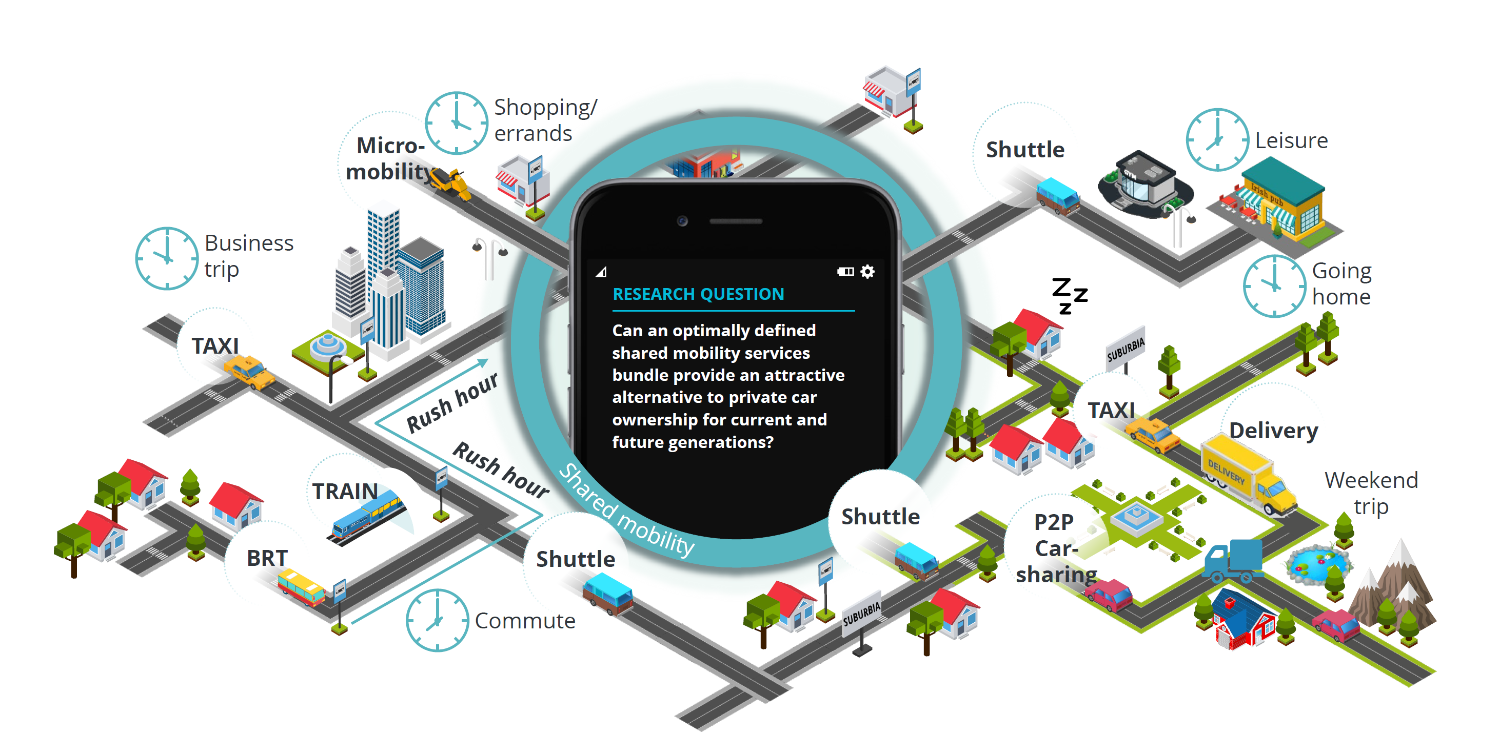Assessing perceived value of MaaS
Student information
Author: Julien Petat
Institution: Erasmus University Rotterdam
Graduation year: 2024
Assessing the perceived value of mobility solutions: A quantitative study in Germany
This study assesses the perceived value of private car ownership and use of shared mobility solutions (MaaS). Persistent reliance on personal vehicles may, at first, appear to be a rational decision, as cars offer greater flexibility, autonomy and speed compared to alternatives such as public transport and bicycles.
The initial research focussed on underestimated car costs, arguing that non-attributable car-related costs and mental accounting heuristics lead consumers to significantly underestimating the actual costs of car ownership by up to 52%. Cost transparency and awareness would thus reduce the number of privately owned vehicles.
However, emotional and symbolic connection to privately owned cars suggests that classic cost-benefit optimisation models must quantify and incorporate monetary equivalents of emotional arousal when trying to understand and influence mobility-related decisions.

Mobility behaviour is complex
Mobility behaviour is complex and prone to behavioural biases. It also involves mental accounting which is not always rational. Understanding a person’s behaviour towards multi-modal travel requires close consideration of:
Geographic constraints: infrastructure and service availability influence options and choices.
Internalising emotions: mobility modes evoke emotions of freedom, security, joy, pride and more, deviating from monetary considerations.
Shifting reference points: valuation assessments and decisions rely on reference points which will change for future generations.
Mental accounting: shedding light on the perceived costs of mobility
Mental accounting is a non-intuitive yet thorough decision-making process and follows some categorisation principles which positively affect money management. Money can be managed from current income, current wealth or future income.
Individuals define their resource account arbitrarily.
Mobility decisions are influenced by the size of the resource account which is cognitively accessible at the time a decision is made.
Flexible booking against the resource account encourages cognitive dissonance and helps justify a decision.
Public transport and mobility as a service (MaaS) expenses are booked against income, whereas expenditure on a private car is booked against wealth.
The survey and key questions
The study was conducted through an online survey using two types of discrete choice experiments. Various methods were used to recruit survey respondents in the greater Munich metropolitan area in Germany.
After presenting general information and requesting consent, the survey began with general eligibility and screening questions to categorise respondents into suitable scenarios. Attitudes towards car ownership and driving were evaluated along three Likert scale questions before presenting the choice experiments.
Single Binary Discrete Choice
Given all your travel needs and options in a typical year, which would you prefer?
Keep access to my primary vehicle and receive no money.
Give up access to my primary vehicle for one year and receive €6,000.
Optimal Shared Mobility Bundle
Imagine you are offered access to a new bundle of shared mobility options to which you have unlimited access. Which shared mobility services would you want to include in this bundle to cover all your travel needs in a year, regardless of their price?
Best-Worst Scaling Experiment
Please imagine that you have to give up access to one of the options below for one year. Which would be the best option, and which would be the worst option to give up for one year?
No access to personal car.
No meetings with friends in person.
Earning €6,000 less.
Findings
The survey found that the value of mobility is independent of car ownership and worth about €10,000 per annum.
Equal value of mobility
The shared mobility bundle was assumed to cover all the respondent’s mobility needs for one year. Mobility is worth the same to individuals whether they currently own a vehicle or not.
Value of private car twice that of shared mobility services used
Shared mobility services used were valued at €3,293 by car owners, almost exactly half the value of their car which lies at €6,673.
Usership highly valued
The value of both ownership and usership constitute the value of a private car. In the survey, the value of ownership was considered to be only a fraction of the total vehicle value (3.2%). This is considerably different to the findings of previous research, which assessed the value of car ownership to be greater than 50% of the total vehicle value.
Furthermore, it is necessary to understand the mental accounting a person makes to assess the likelihood that they will adopt MaaS in favour of their private car.
